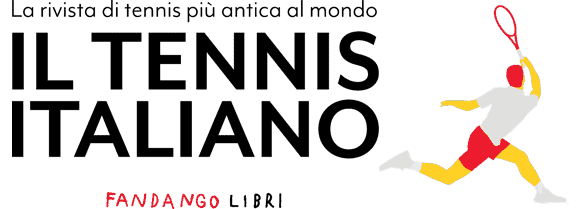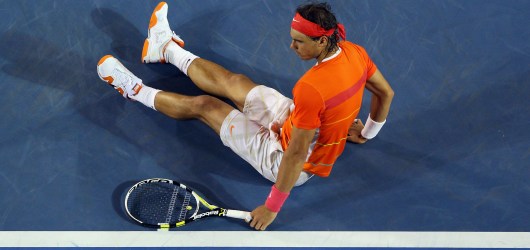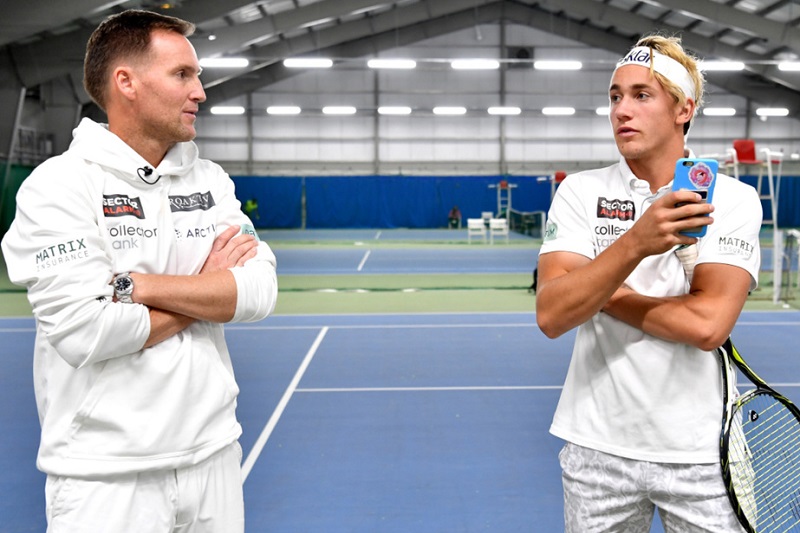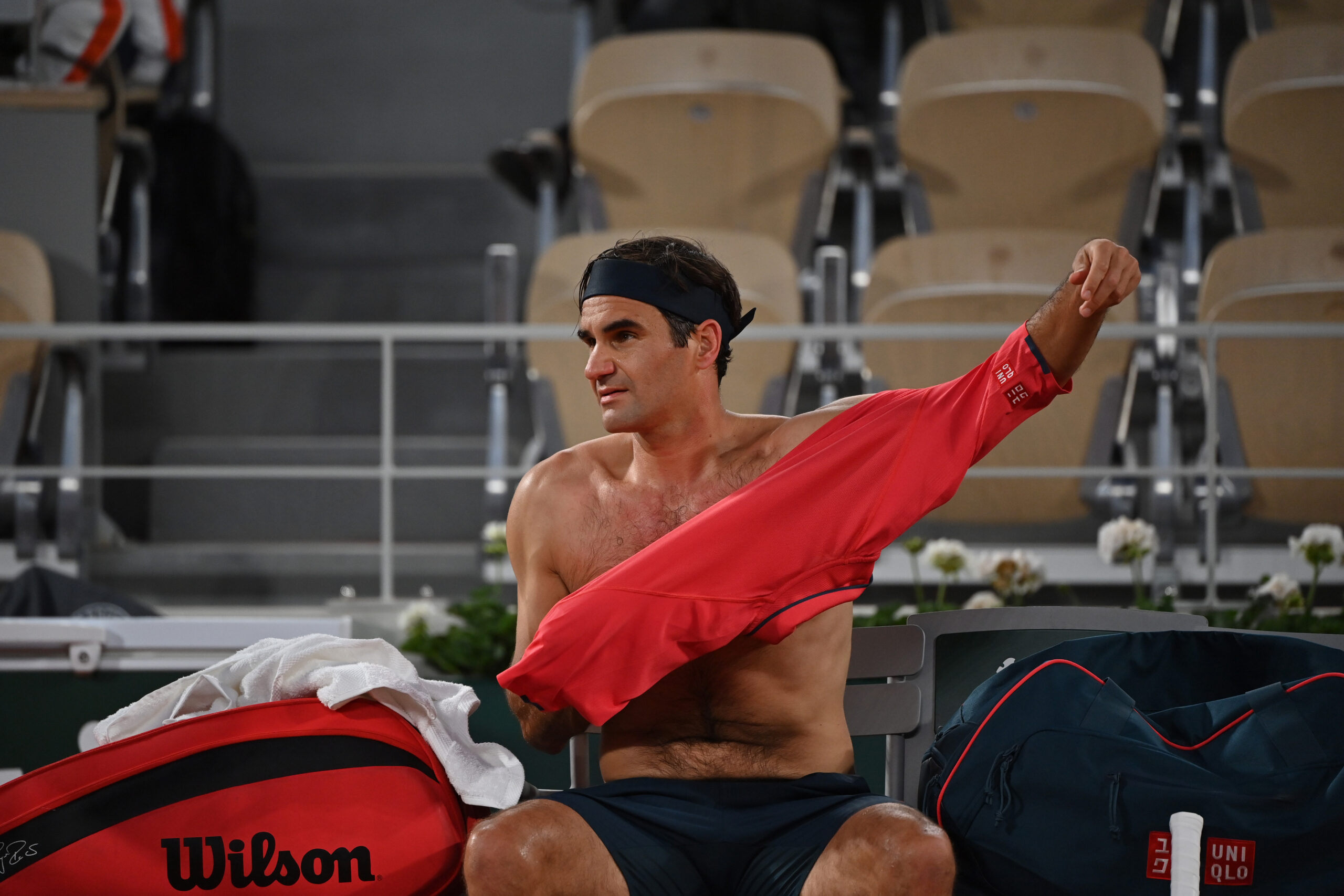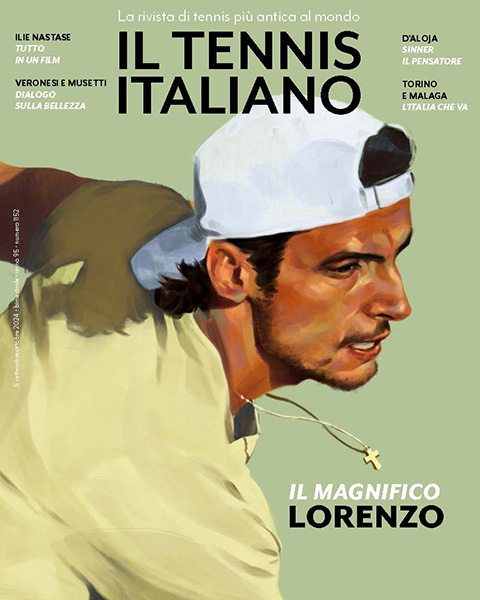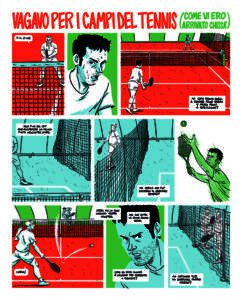foto Getty Images
NADAL
– Hai avuto qualche problema con le scarpe e con l’aderenza in campo?
NADAL: No, credo, le mie scarpe erano un po’ più usate di quanto credessi e tendevo a scivolare. La prossima volta dovrò cambiarle con un paio più nuovo.
– Erano vecchie?
NADAL: Non erano vecchie, ma qui la superficie è abbastanza abrasiva, perciò la suola era più sottile di quanto pensassi.
– E alle dita, che problema hai avuto?
NADAL: Vesciche.
– Sembri più magro dell’anno scorso, più leggero.
NADAL: Devo portare la bilancia domani? Mi chiedete sempre la stessa cosa. Peso esattamente quanto l’anno scorso, quanto cinque anni fa.
SHARAPOVA
– Sei molto contrariata per questa sconfitta al primo turno contro la Kirilenko?
SHARAPOVA:“Potrei essere molto contrariata oppure tornare in campo e rimettermi subito a lavorate sodo. Scelgo la seconda opzione.
– Perché non hai giocato nessun torneo prima di questo?
SHARAPOVA:“Non l’ho mai fatto. In passato ha sempre funzionato”.
– Quindi adesso cominci a pensare a Parigi?
SHARAPOVA:“Parigi? Non ancora. Stai dicendo che dovrei cominciare già a giocare sulla terra rossa proprio adesso? (sorride, n.d.r.). Impossibile. Non è ancora ora di pensare a Parigi, ci sono ancora ‘alcuni’ tornei prima di Parigi, quindi…”
– Cosa farai per tirarti su il morale dopo una sconfitta così pesante?
SHARAPOVA:“Io penso solo che sia stata una giornata no, e andrò avanti con la mia vita. Ci sono situazioni molto più gravi nelle vita che perdere un match di tennis. Ci sono persone nel mondo che non sanno neanche cosa sia un match di tennis. E’ stata una giornata no. Punto. E questo non mi farà smettere di fare ciò che amo. Tornerò in campo e lavorerò più sodo di prima. Tornerò anche qui a giocare di domenica, la domenica della seconda settimana… E’ così che andrà”.
KIRILENKO
– Ti sei messa il dito sulla bocca durante il match. Era per far star zitto il pubblico?
KIRILENKO:“E’ incredibile. Mi è stato chiesto anche in sala giocatori. Mi hanno chiesto il perché di quel gesto, io non lo so. Ognuno può pensare quel che meglio crede. Di solito io penso che significhi che tutto va bene, che tutto è tranquillo, che tutto va per il verso giusto. D’altronde è stata una grande vittoria, ma a fin dei conti ho vinto solo il primo turno. Quindi non è successo niente di straordinario”.
– Sei a conoscenza del fatto che Arshavin (calciatore russo) dopo aver fatto gol fa lo stesso gesto?
KIRILENKO:“Già è vero, mi ha detto la stessa cosa Svetlana Kuznetsova. Lei infatti pensava che io avessi guardato Arshavin prima di giocare. Ma non è stato così, non ho visto la partita prima di giocare”.
– L’anno scorso hai giocato molti doppi in coppia con Flavia Pennetta. Tutti concordavano sul fatto che esteticamente eravate la coppia meglio assortita. Vi siete divise perché c’era rivalità in termini di bellezza?
KIRILENKO:“Sembra proprio che tu sia italiano, mi sbaglio (ride, n.d.r.)? E’ vero, ho giocato con Flavia in doppio per quasi un anno e mezzo. Dopo Wimbledon abbiamo deciso di cambiare perché a volte andavamo bene altre volte meno. Così abbiamo deciso di smettere per un po’. Magari riprenderemo a giocare insieme, vedremo…”.
– Cosa ne pensi dei completi di Maria? Tu fai caso a queste cose quando giochi?
KIRILENKO:“Mi sembra fosse blu, come il Powerade . Cosa altro dovrei dire? Era bello, lei indossa sempre dei bei completi. Io penso però di non essere da meno”.
– Il tuo ragazzo (Igor Andreev, n.d.r.) giocherà contro Federer. Gli hai dato qualche consiglio per battere il grande Roger?
KIRILENKO:“Lui Federer e io la Sharapova. Infatti ci siamo detti che entrambi avremmo cominciato l’anno col botto. Io l’ho fatto… adesso è il suo turno. Naturalmente sarà dura , ma si sa al primo turno, tutto può succedere, e nessun sa come potrebbe andare a finire”.
RODDICK
– Hai fatto una bella caduta?
RODDICK:“Beh, sì. Sono finito addosso a uno di quegli “oggetti immobili” che chiamano giudici di linea. Io non l’ho proprio visto. Da parte sua non mi sembra che abbia fatto molto per spostarsi”.
– Ti era mai successo prima d’ora?
RODDICK:No, mai. Solitamente quando vedono arrivare un giocatore di corsa o si tolgono o cercano di fermarlo. Invece io mi sono sentito come se il giudice di linea stesse facendo un combattimento di wrestling”.
– Beh alla fine nessun infortunio, giusto?
RODDICK:“No, intendiamoci, alla fine ho preso solo una botta. Non voglio farci troppo caso. Diciamo però che visto che sono appena rientrato da un infortunio al ginocchio era meglio evitare”.
– Chi si occupa del tuo cane quando sei via?
RODDICK:“Chi si occupa del mio cane quando sono via? Qualche volta quando parto il mio cane vuole stare a Austin, perché lui espressamente ne fa richiesta, e il mio amico Neal Boban che si è laureato a Dartmouth, si occupa di lui: lo porta fuori tre volte al giorno e ci aggiorna sul suo stato via e mail (sorride, n.d.r.)”.
– Cosa pensi del fatto che tra gli sponsor degli Australian Open ci sia anche un’agenzia di scommesse?
RODDICK:“Io dico che si può avere uno sponsor che vuole farsi pubblicità senza che questo abbia effetti sui nostri ruoli. Tutti noi sappiamo cosa possiamo e cosa non possiamo fare. E in questo momento di crisi economica mi sembrerebbe pazzesco rifiutare i soldi degli sponsor per motivi morali. Io penso che noi giocatori dobbiamo agire in modo responsabile e non penso che qualcuno di noi possa agire diversamente perché vede una pubblicità in campo”.
MURRAY
– Quanta Bikram Yoga hai fatto durante la pausa stagionale?
MURRAY: Solo una volta. Solitamente prima ne facevo di più, ma è difficile mettermi in forma perchè rende molto disidratato. Non si può disidratarsi molto e poi andare a giocare. Quindi si tende a farlo alla fine delle vacanze.
E siccome la pausa stagionale era un po’ più corta, non è stata una delle mia priorità.
– Cosa nei pensi dei suoi prossimi avversari?
MURRAY: Sono entrambi buoni giocatori. Con Gicquel ho giocato una volta. Non sono sicuro se si ritirò. L’ho incontrato a Rotterdam l’anno scorso ed è stato un match equilibrato. Finì tre set. Penso che lui si fermò sul 3-0 nel terzo. È un giocatore difficile, ha molta esperienza, abbastanza rapido.
Bolelli è molto talentuoso. Può colpire la palla forte da dietro il campo. Ma ho giocato veramente bene contro di lui le ultime volte.
foto Getty Images
THE MODERATOR: Questions, please.
Q. Would that be the best win of your short career?
MARIA KIRILENKO: Well, I think I already beat her maybe a few years ago, Maria, and I beat already couple good players from top 10.
I think it’s one of, yeah, the best wins for me.
Q. Did you have a game plan going into the match?
MARIA KIRILENKO: Well, of course, yes. And I expect it you know. Maria Sharapova plays so aggressive and her ball’s coming so hard.
And, yeah, I was prepare, you know. I was also trying to be aggressive. And, yeah, I think that’s help me as well.
Q. What was going through your mind with two match points?
MARIA KIRILENKO: Well, nothing, I think, special. I was just concentrate, try to concentrate on the point and imagine that it’s not the match point, you know. Because when you have a match point, of course the nerves going to you, and you just, yeah, too emotion.
And, yeah, I try to be, you know, calm, focus. Then, yeah, when I won the match point was great.
Q. At what point in the match did you know that you had her in the bag?
MARIA KIRILENKO: Actually, in the first set I was a little bit late, you know. She was playing so aggressive, and I kind of made a defensive, you know, play.
And then I start to feel much better in the second set actually. I start to feel that I can be aggressive, as well. I did more winners than in first set.
And from that point, I start to feel that, yeah, I’m playing good from the baseline and I can beat her.
Q. You’ve had some knee problems. Suddenly did you feel like you were moving much better than you had for a long time?
MARIA KIRILENKO: Yeah, it’s true. I had a knee problem last year, actually here in Australia. It was not so good. Actually after Wimbledon, yeah, I start to make some treatment, you know. It’s really help me.
Since that time, I have a less pain on my knee. For example, today I played three and a half hours, and I didn’t even have a pain. And I was moving quite good, I think.
Q. To be a friend of Maria and know her well, it helps or it doesn’t help at all?
MARIA KIRILENKO: Well, actually I’m friend with everybody, you know. All the locker room are my friends (laughter).
I mean, you know, when you on the court, you don’t think about that she’s my friend or what. Both of us want to win, you know, and be in the next round.
So that’s what you think about.
Q. Is it possible I read on your lips vamos sometimes when you do a point, or not?
MARIA KIRILENKO: Yes, because I’m practicing in Spain, in Valencia, and all the guys, coaches, they always saying vamos. That’s why I think say instead of say, Come on, I said, Vamos.
Q. What did you do in the off?season, and what was your routine leading up to this?
MARIA KIRILENKO: Yeah, I had last tournament in Moscow n my hometown. After that, I had holidays at home actually for, I don’t know, I think two weeks, and then I start to practice in Moscow with my fitness, and also a little bit of tennis, you know, step by step.
Then I went to Valencia for practice more.
Q. When did you come here?
MARIA KIRILENKO: I came Wednesday, I think. Because I played Auckland, and then I didn’t play Sydney because I was late for the quallies. I had to play quallies there. I had a nice week practice before Australia.
Q. You put your fingers to your lips late in the match. Was that to get the crowd to quieten down?
MARIA KIRILENKO: It’s unbelievable. I got so many questions in the locker room, in the players’ lounge. What did you do? What does it mean? I don’t know. Everyone can think what does that mean.
Normally, it was for me actually, that everything is calm, you know. Because, you know, of course it’s a great win, but it’s only the first round I pass. It’s nothing big happens actually.
Q. Do you know that usually Arshavin does the same when he kicks the goal?
MARIA KIRILENKO: Yeah, that’s true. That’s what Kuznetsova just told me. Because she thinking that I was watching Arshavin before the match.
But that’s not it. I said, No, I didn’t watch.
Q. At 5?3 you threw away a couple of line challenges. You seemed quite desperate to get it finished. How important mentally is it to come through a match like that?
MARIA KIRILENKO: Yeah, I get a little bit nervous at 5?3 when I was serving. Actually, her return, she start to play quite aggressive. For me was little bit difficult, you know, because the ball coming so fast.
When you little bit nervous, you need to control the ball as well. Maybe was a little bit short and she, yeah, just made some winners.
But actually I didn’t do mistake. I didn’t make easy mistake, so she won that game.
Q. Is it hard as a returner to know what to expect with Maria’s serve?
MARIA KIRILENKO: I mean, yes, her serve ?? she didn’t do too much double?fault actually today. I expected to get more (laughter).
And, yeah, her serve was quite fast. You know, I watch on the speed machine, was 108. Like she improve with the serve, the speed of the serve.
And I think my return is quite good. I return so many her serve today, especially first serve.
Q. Last year you were playing a lot of doubles together with Pennetta. Everybody said it was the best pair from an aesthetic point of view. Did you split up because there was a rivalry in terms of beauty?
MARIA KIRILENKO: It sounds like you’re from Italy, right (laughter)?
Yeah, I played with Flavia one and a half year, I think. After Wimbledon, I don’t know, we both decide to stop and change the partner, because sometimes it’s going so well and then, you know, it doesn’t go well. Then you want to stop for a moment.
I don’t know, maybe we continue to play with her in the future.
Q. What did you think of Maria’s outfit or costume? Do you ever pay attention to things like that?
MARIA KIRILENKO: It was blue, I think, like POWERade. I mean, yeah, what can I say? Was good dress. She always have a nice dresses. I think I always have a nice dresses, as well.
But I change from Stella from US Open, and still I think they did making good clothes for me, so colorful. I’m really comfortable in that, as well.
Q. Your boyfriend plays Federer. Have you had a word about how to take down the big guns?
MARIA KIRILENKO: Yeah, he had Federer and I have Sharapova. I think before the matches he said that we can start the year like loud, you know (laughter). And I already start the year loud, I think. So now his turn.
Of course is going to be tough, but, you know, in the first round, you know, never know what’s gonna happen.
foto Getty Images
THE MODERATOR: Questions, please.
Q. Can we have your thoughts on your first match?
ANDY RODDICK: Yeah. I thought I played the right way. I could have executed probably a little bit better at times.
But overall I thought it was pretty good. You know, first rounds are always a little uncomfortable, especially at a slam. You know, you’re kind of built up, you’re maybe a little bit overanxious.
But I thought ?? overall I thought it was all right.
Q. A lot of the players say that about first rounds. Sharapova goes out today. What is the key when you’re going out there not to get too overhyped?
ANDY RODDICK: You can’t really control the way you feel. It’s just a matter of trying to manage it when you’re out there.
You know, it’s a week of buildup, a week of practice, then all of a sudden it seems like it’s here. You know, you don’t really know ?? you can’t really replicate the match conditions in practice. So it is about getting used to it all over again.
Then once you kind of find a comfort zone, it’s fine. It’s kind of a matter of getting up. It’s tough to do that. It’s tough to kind of get your feet under you if you fall behind early.
Q. Looks like you were pretty anxious to get back out on the court in Brisbane. At what point last fall were you saying, I have to get on the court to play some matches again?
ANDY RODDICK: Uhm, you know, it wasn’t really get back on the court. At first it was I got to be able to walk, then it was I got to be able to run, then I got to be able to move side to side. I always kind of had that goal right in front of me. I didn’t really think about it.
I guess probably ?? you know what, when I started Brisbane I was about ready to start as far as health. Obviously I always want to be on the court and going and spectating at the World Tour Finals for ? I think I was there for two days ? that wasn’t easy, especially when I feel like I had earned my spot.
It was a constant procession of little goals that led up to Brisbane.
Q. Could you make a comment on the De Bakker’s game and his potential?
ANDY RODDICK: Yeah, I definitely was impressed in spurts. Now I think it’s just a matter of consistency. I mean, he hits the ball great. You know, we hadn’t seen him play at all. Larry went out and watched him just hit, and he said, He’s smooth.
I thought third set he played a little better, maybe he was a little looser. He could probably maybe get a little bit quicker. But overall he certainly seems to have the foundation for a pretty good game.
Q. Did you take a tumble out there?
ANDY RODDICK: Yeah, I ran into one of those immovable objects called a referee. He wasn’t giving up any ground. I didn’t see him. He wasn’t really trying to do much to get out of the way.
Q. Has that ever happened to you before?
ANDY RODDICK: No. No. I don’t think so. Normally they see a player running full speed, they decide to at least move or catch the player. You know, I felt like he was trying out for WWE or something, just letting me go.
Q. No injury, though? Didn’t get hurt at all?
ANDY RODDICK: No. I mean, I kind of pinched it a little bit. You know, I promise you that first step afterwards was a relief. You know, I definitely don’t want to go doing that a whole lot.
Q. You pinched what?
ANDY RODDICK: Well, the last thing to come back for my knee is gonna be range of motion, you know. Instead of getting your heel to go all the way back, you kind of work it back slowly, and it kind of jarred a little bit.
But, you know, it’s a good sign that I can kind of take that. You know, it didn’t do too much to me.
Q. How would you rate your physical shape now compared to the normal start of a year?
ANDY RODDICK: I was able to get plenty of time in as far as running and training. So, uhm, as far as fitness level, as far as endurance and strength and stuff, I feel fine.
Q. As a long?time Davis Cup player, what is your take on this new World Cup idea?
ANDY RODDICK: We’ll see. It’s certainly a lot more conducive to our schedules, which is a big plus. It’s a lot easier to carve out 10 days every two years as opposed to, you know, if it’s an away tie, that’s 10 days in lead?up four times a year.
You know, we’ll see what happens with it. It certainly is an intriguing prospect. But, you know, we all have a lot of ideas. You know, the tough part is making it work. So we’ll see what happens with that.
Q. Would you see it as a bit of a risk if the Davis Cup format went away, given that that competition has a long history?
ANDY RODDICK: Give me that question again.
Q. Wouldn’t it be a bit of a risk to go that way? Because if it doesn’t succeed, Davis Cup might lose part of its allure.
ANDY RODDICK: It has been in the sport for a long time. You know, I wish there was a little more cooperation from Davis Cup, and then we would probably be a little bit more sympathetic to that question.
Q. Who takes care of your dog when you’re away?
ANDY RODDICK: Who takes care of my dog when I’m away? Questions I didn’t think I was going to get today.
Q. You tweet about your dog.
ANDY RODDICK: Yeah, my dog is at the in?law’s right now. Sometimes when I leave, the dog wants to stay in Austin, because it just tells us, and my friend Neal Boban, who graduated from Dartmouth, takes care of it, takes it out thrice daily, emails us updates (laughter).
Q. Thank you.
ANDY RODDICK: Thank you (smiling).
Q. Do you find it a little strange that the Australian Open would have an official partnership with a betting company, Betfair?
ANDY RODDICK: You know what I say. I say you can have a sponsor that wants to advertise, that I don’t really see how it affects, you know, our roles. I think we all know what we can and can’t do.
At this point with this economy, I do think it would be foolish to say no to willing sponsors. You know, it’s still up to us as players to act responsibly. I don’t think that changes because of signage on a court.
foto Getty Images
THE MODERATOR: Questions for Maria.
Q. From your viewpoint, what went wrong?
MARIA SHARAPOVA: Just didn’t win the match. You know, bottom line.
Uhm, you know, certainly had my chances and just didn’t execute. You know, I felt like I was ?? when she was up and then I’d get back there, back in the game, I just didn’t take advantage of that and let her, you know, let her control the situation again.
Q. What are the challenges of playing someone you know so well and is a friend?
MARIA SHARAPOVA: Uhm, I mean, when we go on the court we don’t really think about that. We just go out and we try to play our game, you know. No matter how well you know someone or not, it’s a new day and a new match, and you just try to go out there and perform.
Q. Is this one of the matches early in the season you were looking for consistency and it just wasn’t there today?
MARIA SHARAPOVA: Yeah. I mean, there is no gray area. It was just up and down in many areas, and just finished at the down level (smiling).
Q. Was it a lack of match practice? You needed a few more matches perhaps to sharpen up?
MARIA SHARAPOVA: I mean, I don’t really know what ‘match practice’ has to do with being up 4?2, 15?40 and not making a second serve return, so…
Q. Your serve let you down again at crucial times. How much of a frustration has that become for you?
MARIA SHARAPOVA: Actually, I thought I served pretty big. I don’t think that was the reason I lost the match today. Uhm, I served big when I had to. I served big second serves.
You know, if I’m gonna serve at that pace and do it for three hours and make those types of mistakes, then I’m okay with it. You know, I’m okay with making mistakes when I’m going after it, trying to control the situation instead of being passive.
Q. So you’re happy with where your serve’s at?
MARIA SHARAPOVA: There’s still a lot to improve. You know, there’s a lot of consistency that I’ll have to add to it.
But as far as, you know, how I hit it and, uhm, the level, where it was compared to where it was last year, it’s great. I felt really good about it coming here.
Q. Did you ever feel really good at any time during the match off the ground?
MARIA SHARAPOVA: I mean, she’s not really the type of player that makes you feel that good, but there are many of those types of players. She changes the pace a lot. Uhm, you know, she just has a little bit of a different type of game. Today she was just able to execute many things really well.
Q. In Grand Slams, you’ve always given the impression of knowing exactly where the ball is going. Have you lost a little bit of the belief that where you hit it is where it’s going to land?
MARIA SHARAPOVA: I wouldn’t say it’s ‘belief.’ I think ‘belief’ is either something you have or you don’t have. Whether it’s just a little bit of, uhm, you know, maybe confidence, uhm, obviously it’s the first tournament of the year and, you know, I just came up against somebody that just played really good tennis. That’s just the way it goes.
Q. How would you describe your sense of confidence right now?
MARIA SHARAPOVA: Uhm, well, I’m leaving on Monday of the first week, so that explains a lot.
Q. What is your level of confidence like with your own body and your fitness? Does that play on your mind at all?
MARIA SHARAPOVA: With what?
Q. Your fitness, the shoulder.
MARIA SHARAPOVA: No, doesn’t.
Q. During matches does it play any part? Is it holding you back at all?
MARIA SHARAPOVA: No.
Q. Where is your level of disappointment, or do you just chalk it up, It’s first round of a Grand Slam, that can happen first round of a slam?
MARIA SHARAPOVA: I mean, I could be disappointed or I could just take it as it is and just go back on the court and just keep working.
I choose option two (smiling).
Q. Why didn’t you play any tournaments before?
MARIA SHARAPOVA: I never do. It’s worked before.
Q. So do you go on and start thinking about Paris now?
MARIA SHARAPOVA: About Paris?
Q. About Paris.
MARIA SHARAPOVA: Not yet. Are you saying I’m going to go on a clay court right now (smiling)? Wishful thinking.
No, not yet. We have a few more events before Paris, so…
Q. What do you say to yourself now in order to recover, let’s say, psychologically from a defeat which is painful, I guess?
MARIA SHARAPOVA: Uhm, that it’s a bad day and you have to get on with your life. You know, there are many worse situations in life. There are people that don’t even know what a tennis match is in the world.
You know, just a bad day. A bad day’s not going to stop me from doing what I love. I’m still gonna go back on the court and work hard and perform. I’ll be back here on a Saturday of the second week, so you’ll watch.
foto Getty Images
THE MODERATOR: Questions, please.
Q. What are your thoughts after the game?
RAFAEL NADAL: Happy. Happy always starting Grand Slam. Winning in three sets is good news, so very happy to be in second round.
Q. What were your thoughts maybe through the first set, because it didn’t look like it was all going to be as easy as you thought it might have been.
RAFAEL NADAL: No, I never thought it was going to be an easy match before going on court. And, sure, playing the first round of one Grand Slam, you know, you know always the first round is a little bit more nervous and you have to start. First rounds are always difficult to play very well.
So I thought gonna be a tough match. First set was tough. Later was easier.
Q. Did you step it up in that tiebreak? Did you find something in that tiebreak and go on with it from there?
RAFAEL NADAL: No, I think, well, Peter was playing really well in the first set. I was playing shorter than usual. I played with more mistakes.
So late in the tiebreak he had three mistakes, so he helped me. And I was serving well, so I won the tiebreak. After that I started to play longer, I started to play more aggressive, so I started to play more my tennis.
Q. What is the difference, when you say you started to play longer, more aggressive? Is it just confidence and getting more belief in the second and third sets?
RAFAEL NADAL: No, when you relax a little bit. The first set I had the chances for the breakpoint. One breakpoint I played well, but I had the passing shot mistake to the net, very close, and he played well.
So you start always. I said before, a little bit more nervous than usual. When you win first set you relax a little bit more, you can play more your game, no?
I think I did. I was playing really well, practicing before in Doha and Abu Dhabi, too. I think I’m always in the right way. I told you before, when you relaxed, you have the chance to play more your tennis.
Q. How was the crowd?
RAFAEL NADAL: Always is nice. The atmosphere here always in Australia is special. The crowd are emotional. I played few matches against Lleyton, too, here. Against an Australian, he has big supporters.
Q. Were you having some problems with your shoes or the grip on the court sometimes?
RAFAEL NADAL: No. I think the problem my shoes was a little bit more used than what I thought before the match. I was slipping a little bit more. I gonna change for next one, new ones.
Q. A bit old, were they, the shoes?
RAFAEL NADAL: No, no, wasn’t old. But here the court, yeah, I started to play with the new shoes two days ago, but the court here is aggressive. Behind the foot was thinner than what I expected.
Q. And the fingers?
RAFAEL NADAL: The blister.
Q. Are you in favor of this World Cup of tennis that people are talking about?
RAFAEL NADAL: We will see. We will see what’s going on. I think ATP wants to do something. Sure, World Cup with all the players, best player of the world and playing for your country, with good organization and a big event, for sure I am in favor.
Q. You seem a bit slimmer than last year, a bit lighter.
RAFAEL NADAL: Can we bring scales tomorrow? Everybody ask me the same. If we bring something here, I gonna put… I have the same weight than last year. I weigh the same five years ago. I didn’t change.
Q. After the match, Jim Courier was asking you about last year, reflecting on the semifinal, the final. Coming back to Melbourne, have you been thinking about that a lot?
RAFAEL NADAL: No, I am thinking about try to play good tournament. Sure, when I walk around and I see my picture there, being on the floor, so always is a very nice memories.
You know, was one of the more emotional victories of my career, semifinals and final. So always when you come back in a big event like this, you remember the matches.
Q. Is it an advantage having the feature match at night now being the earlier match? You know when your starting time is going to be.
RAFAEL NADAL: Well, sure is good if you have exactly the time what you’re gonna play. But it’s true we play indoors, too.
But anyway, I am happy to finish. I feel lucky to finish my match today. That’s important. I was a lot of times in the other situation than the rest of the players. Is not easy wait all the day to play.
foto Getty Images
Q. You must be very satisfied with that.
ANDY MURRAY: It was a good start. You know, he’s a tough player. You know, he beat Djokovic before in Miami. He’s won a tour event. So knew it wasn’t going to be ?? I wasn’t expecting it to be easy.
I just got off to a good start, which helped. Broke him straightaway. That always makes a big difference.
Q. You played under the roof at Wimbledon with phenomenal noise. Was it very different under the roof here?
ANDY MURRAY: Not really. It’s just, you know, you create your own atmosphere on the court, I guess.
But the conditions are similar to Wimbledon with the roof. It actually slows the court down. You know, it gets quite humid in there, whereas it’s pretty dry heat normally, and it’s just quite heavy.
It slows the court down a bit, so that was a bit different.
Q. Did the Hopman Cup experience help you under the dome, as well, mixing it around with the mixed doubles as well?
ANDY MURRAY: Well, I think it helped to get me ready for the tournament, yeah. I mean, I played eight matches in about five, six days. You know, so it was perfect to kind of get the body back used to playing again.
Uhm, and, yeah, maybe because that event was indoors, maybe I adjusted to the conditions a little bit quicker. But it’s good to get the match out of the way today ‘cause, uhm, it’s a long day for a lot of the players because of the weather outside. Obviously good to get finished quickly.
Q. How much Bikram Yoga did you during your off?season?
ANDY MURRAY: Only went once. Used to do a little bit more beforehand, but it’s difficult to fit in ‘cause you get very dehydrated doing it. You know, you can’t really dehydrate yourself that much and then go and play. So you tend to do it at the end of the days.
And because the off?season was a bit shorter, that wasn’t one of the main priorities. So only once this time.
Q. Do you have a preference if it’s closed or not? How much difference does it make to you whether you’re going to play indoors or outdoors here?
ANDY MURRAY: Well, it definitely makes a difference. I mean, obviously, you know, it’s pretty cool in there. It was cool outside today, as well. You know, but I guess today it’s maybe a little bit easier to play indoors, because you know once you get on the court you’re going to finish. You’re not getting stopped.
And also I’ve watched, you know, some points of some of the matches on the outside courts, and it’s pretty windy out there, too. Pretty tough conditions to play in.
Indoors, obviously it’s a lot easier.
Q. Can you run us through your next opponents?
ANDY MURRAY: They’re both good players. Gicquel I played once before. Not sure if he retired. I played him in Rotterdam last year. It was close. It went to three sets. I think he might have stopped at like 3?Love in the third. He’s a tough player, a lot of experience, pretty quick.
Bolelli is very talented. Can hit the ball huge from the back of the court. But I played really well against him the last couple times.
I don’t know, expect a pretty close match, I think.
Q. Having changed your buildup to this Open, starting with a new sponsor, does it feel different this year in any particular way?
ANDY MURRAY: Yeah, a lot of things have changed, you know, especially in the buildup to the event. Obviously I got here a lot earlier. Today was the first, you know, match on the tour, I guess, after quite a long break.
So that changes things a little bit, whereas I’ve come in the last years having played a lot of matches in Doha. Obviously, play with new clothes and changed the weight and stuff of my racquet a little bit at the end of the year. Less people with me this year. So changed quite a few things up.
